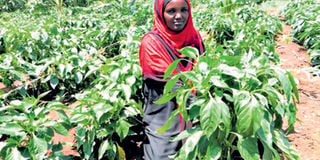Do not give me aid, support my farming

Isnina Bille weeds capsicum at her farm in Abaqdera Village, Garissa County. PHOTO | SOPHIE MBUGUAH | NATIUON MEDIA GROUP
What you need to know:
- To feed her children and elderly parents, Isnina burned and sold charcoal on the highway and later bought a sewing machine from the income to beef up her earnings.
- Abshir Mohammed Abdi, Regal-IR senior programme officer, affirms that Isnina is among the most influential farmers, who are helping break cultural perceptions that hinder crop farming among the Somali.
- Isnina grows water melons, maize, capsicum, and bananas under irrigation with water from River Tana. This is the third season she is farming.
Tall, chocolate-skinned, dressed in a black dress and a red and black scarf, Isnina Bille cuddles her two-year-old daughter who clings to her, hiding from the strangers who have just visited their farm.
The mother of eight is among 20 families who have ditched pastoralism and embraced crop cultivation at Tawakal Farm in Abaqdera Village, some 52 kilometres from Garissa Town. Isnina went against the advice of her husband and members of her community to raise crops. Her family moved to Abaqdera Village during the 2011 drought to have access to relief food.
“I lived in the interior of Fafi plains. As drought persisted, we needed food, but we couldn’t access it because we were far from the food distribution point. We thus had to move,” she says.
In 2011, the Horn of Africa suffered one of its worst hunger crises, with more than 13 million people in Ethiopia, Northern Kenya, Djibouti and Somalia bearing the brunt. “We lost all our goats. My family had 350 sheep, and only 35 survived,” she says.
To feed her children and elderly parents, Isnina burned and sold charcoal on the highway and later bought a sewing machine from the income to beef up her earnings.
Today, the village that started off as a Kenya Red Cross relief distribution point no longer relies on relief as 20 families have teamed up with the help of Resilience and Economic Growth in the Arid Lands — Improving Resilience (Regal-IR) to register and cultivate Tawakal Farm.
Established in February 2014, each family tills and takes care of half an acre of the 10-acre farm.
CONSIDERED A TABOO
“My husband did not want to get involved because farming is considered a taboo among the Somali community. The number of livestock one has defines their (financial) status,” she explains.
Despite the opposition, Isnina raised Sh1,500 from her tailoring and charcoal business and contributed in the group. Each member needed to raise that amount to help clear bushes in the village, buy a water pump and register the group.
Abshir Mohammed Abdi, Regal-IR senior programme officer, affirms that Isnina is among the most influential farmers, who are helping break cultural perceptions that hinder crop farming among the Somali.
Regal-IR is a programme of African Development Solutions (Adeso) and is funded by USAid. The project provides technical and extension services support through the government.
“We organise training on how to draw a farm layout, make seedbeds, as well as support them with seedlings,” Mohammed says. “For sustainability, the group is responsible for bush clearing and the day-to-day management of the farm.”
Isnina grows water melons, maize, capsicum, and bananas under irrigation with water from River Tana. This is the third season she is farming. Her best harvest so far is 19, 50-kilo bags of maize, which she sold at Sh2,000 a sack. She also harvested 18 20-kilo bags of chillies, which she sold at Sh60 per kilo, and 100 pieces of water melon, which she sold at Sh50 each.
“After the first harvest, I managed to make Sh64,000. With the proceeds, I opened a shop in town, which my husband operates,” she says.
They have also bought a cow and three goats. “I expect my earnings to go up this season since bananas should be ready to harvest by December.”
Regal-IR programme is strengthening social, economic and environmental resilience among 558,000 people in Garissa, Isiolo, Marsabit, Turkana and Wajir counties.
CAPABLE OF MILKING GOATS
It aims at reaching and empowering 13,950 households in Garissa in the next five years. “As women, we are perceived as only capable of milking goats and taking care of the children.
“But today, we are not only the main farmers, but the farm managers. My children and I are not willing to receive relief food again,” Isnina says.




